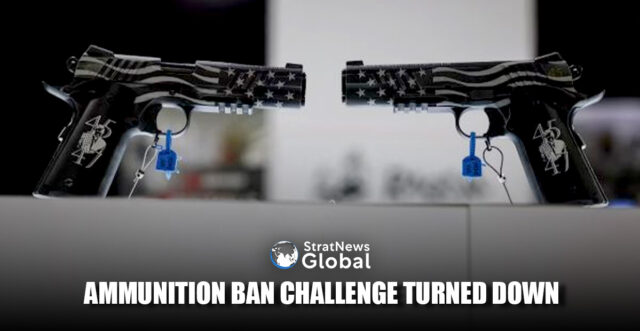The U.S. Supreme Court on Friday refused to take up a case challenging the legality of Washington, D.C.’s restriction on high-capacity ammunition magazines, passing up an opportunity to further define or expand gun rights.
The justices turned away the challengers’ appeal of a lower court’s ruling that upheld the Democratic-governed city’s ban on virtually all ammunition-feeding devices holding more than 10 rounds. The lower court rejected arguments that the measure violates the U.S. Constitution’s Second Amendment right to “keep and bear arms.”
The four men who challenged the law had asked the Supreme Court to consider whether the Second Amendment allows a categorical ban on arms that are commonly used throughout the United States for generally lawful purposes such as self-defence. The challengers all hold concealed-carry pistol licenses for the District of Columbia and regularly carry a pistol there.
Gun Control Law
The Supreme Court has dramatically expanded the Second Amendment in recent decades, including in a landmark 2008 ruling that struck down a strict gun control law in Washington and declared that individuals have a right to own guns for such lawful purposes as self-defence in the home.
In 2022, powered by its 6-3 conservative majority, the court made it harder to defend gun restrictions under the Second Amendment, requiring that such limits be “consistent with the nation’s historical tradition of firearm regulation.”
The District of Columbia’s government makes it illegal to possess or sell any ammunition-feeding device that holds more than 10 rounds, with only a narrow exception. The city’s lawyers in court papers wrote that it has restricted the capacity of gun magazines “in some form for close to a century.”
Washington-based U.S. District Judge Rudolph Contreras in 2023 ruled in favour of the city, finding that large-capacity magazines are not “typically possessed for self-defence,” citing evidence showing that around two shots on average are fired in self-defence situations.
The judge also found the city was likely to prevail in the case because it had demonstrated that its law is consistent with firearms regulation grounded in the “historical tradition” of the United States.
The U.S. Court of Appeals for the District of Columbia Circuit in a 2-1 decision upheld the judge’s ruling in October 2024, prompting the challengers to appeal to the Supreme Court.
Supreme Court Rejected Similar Challenges
The Supreme Court on June 2 declined to hear a similar challenge to Rhode Island’s ban on large-capacity magazines, as well as a challenge to a ban in Maryland on powerful semiautomatic rifles such as AR-15s, after lower courts upheld these restrictions.
The court on March 26 upheld a federal regulation targeting largely untraceable “ghost guns.” In two rulings last year, it upheld a federal law that makes it a crime for people under domestic violence restraining orders to have guns but rejected a federal rule banning “bump stocks” – devices that enable semiautomatic weapons to fire rapidly like machine guns.
Friday’s action by the court was unexpected. The court had planned to release it on Monday along with its other regularly scheduled orders, but a software glitch on Friday prematurely sent email notifications concerning the court’s decision in the case.
“As a result, the court is issuing that order list now,” said court spokesperson Patricia McCabe.
It is not the first time the court has inadvertently disclosed action in sensitive cases. Last year, an apparent draft of a ruling in a case involving emergency abortion access in Idaho was briefly uploaded to the court’s website before being taken down.
That disclosure represented an embarrassment for the top U.S. judicial body, coming two years after the draft of a blockbuster ruling rolling back abortion rights was leaked.
(With inputs from Reuters)





